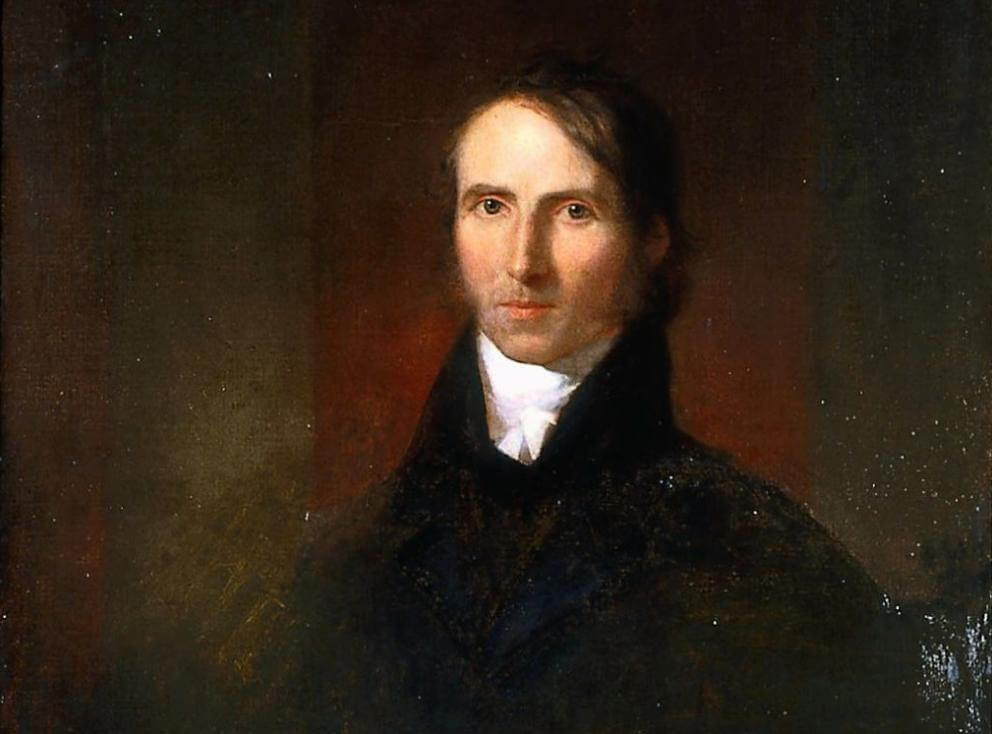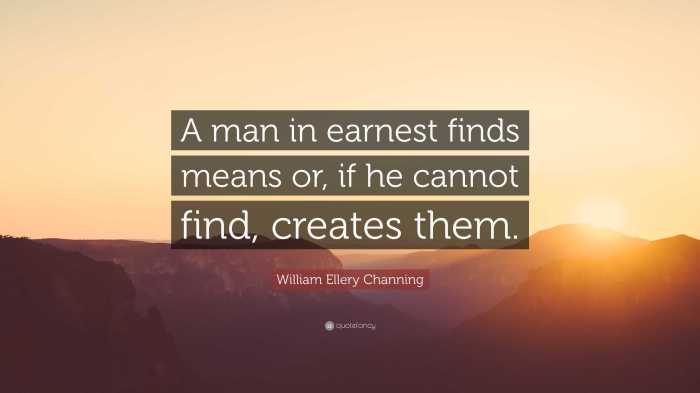According to William Ellery Channing, the renowned Unitarian minister, social reformer, and literary figure, the path to a just and enlightened society lay in the cultivation of reason, compassion, and spiritual growth. His unwavering commitment to these ideals shaped his life’s work and left an enduring legacy on American thought and society.
Channing’s early life and education laid the foundation for his intellectual and spiritual journey. Born into a prominent Boston family, he received a rigorous education that fostered his love of learning and his deep concern for social justice. His experiences as a student at Harvard College and as a young minister in Boston’s Federal Street Church shaped his Unitarian beliefs and his commitment to social activism.
Early Life and Education: According To William Ellery Channing

William Ellery Channing was born in Newport, Rhode Island, on April 7, 1780. His father, William Channing Sr., was a prominent lawyer and judge, and his mother, Lucy Ellery, was the daughter of William Ellery, a signer of the Declaration of Independence.
Channing’s early education was overseen by his father, who instilled in him a love of learning and a strong sense of social responsibility.
In 1794, Channing entered Harvard College, where he excelled in his studies. He was particularly drawn to philosophy and literature, and he developed a deep interest in the works of the Enlightenment thinkers, such as John Locke and David Hume.
Channing graduated from Harvard in 1798 with high honors, and he soon began his career as a Unitarian minister.
Influences on Channing’s Intellectual Development
Channing’s intellectual development was shaped by a number of factors, including his early education, his experiences as a Unitarian minister, and his interactions with other leading thinkers of his time. Channing’s father was a strong influence on his son’s intellectual development.
William Channing Sr. was a well-educated man who instilled in his son a love of learning and a strong sense of social responsibility. Channing’s experiences as a Unitarian minister also played a significant role in his intellectual development. As a Unitarian minister, Channing was exposed to a wide range of religious and philosophical ideas, and he developed a deep understanding of the different ways in which people experience and understand the divine.
Channing’s interactions with other leading thinkers of his time also helped to shape his intellectual development. Channing was friends with many of the leading intellectuals of his day, including Ralph Waldo Emerson, Henry David Thoreau, and Margaret Fuller. These friendships exposed Channing to a wide range of ideas and perspectives, and they helped to broaden his understanding of the world.
Unitarian Beliefs and Social Activism

William Ellery Channing was a prominent Unitarian minister who played a significant role in the development of Unitarianism in the United States. Unitarians rejected the traditional Christian doctrines of the Trinity and the divinity of Jesus, emphasizing instead the importance of reason, tolerance, and social justice.
Channing was a passionate advocate for social justice and was involved in various reform movements. He spoke out against slavery, supported prison reform, and advocated for the rights of women and workers. He also played a leading role in the establishment of the American Unitarian Association, which served as a central organization for Unitarian churches in the United States.
Social Activism
Channing’s social activism was rooted in his Unitarian beliefs. He believed that all people were created equal and that they deserved to live in a just and equitable society. He argued that it was the duty of Christians to work for social change and to improve the lives of the less fortunate.
- Abolition of Slavery: Channing was a vocal opponent of slavery and spoke out against the institution on numerous occasions. He argued that slavery was a violation of human rights and that it was incompatible with the principles of Christianity.
- Prison Reform: Channing was also a strong advocate for prison reform. He believed that prisons should be places of rehabilitation rather than punishment, and he worked to improve the conditions in which prisoners were held.
- Rights of Women and Workers: Channing was a supporter of the rights of women and workers. He argued that women should have the same rights as men and that workers should be treated fairly and justly.
Literary Contributions

William Ellery Channing made significant contributions to American literature through his sermons, essays, and speeches. His writings addressed a wide range of topics, including religion, social reform, and national identity.
One of Channing’s most important literary works is “The Importance and Means of a National Literature” (1830). In this essay, he argued that the United States needed to develop its own distinct literary tradition, free from the influence of European models.
He believed that a national literature would help to foster a sense of national unity and pride, and would allow Americans to express their unique experiences and perspectives.
Channing also wrote extensively about social reform. In his essay “On the Elevation of the Labouring Portion of the Community” (1840), he called for the improvement of the working conditions and living standards of the poor. He believed that all Americans deserved the opportunity to live a decent and fulfilling life, regardless of their social class.
Style and Themes
Channing’s writing style was characterized by its clarity, eloquence, and persuasive power. He was a master of the English language, and his sermons and essays were widely read and admired. Channing’s writing was also notable for its moral and ethical insights.
He believed that religion should be a force for good in the world, and he urged his readers to live their lives according to the principles of love, justice, and compassion.
Transcendentalism and the American Renaissance

William Ellery Channing’s relationship with the Transcendentalist movement was complex and multifaceted. While he shared many of the movement’s core beliefs, such as the inherent goodness of humanity and the importance of intuition and experience over reason and tradition, he also maintained a critical distance from its more radical elements.
Channing’s influence on other Transcendentalists was significant. His writings helped to shape the movement’s intellectual and spiritual foundations, and he provided a model of engaged Christianity that resonated with many of its members. He was also a close friend and mentor to Ralph Waldo Emerson, the movement’s leading figure.
Channing’s Contributions to the American Renaissance, According to william ellery channing
Channing’s contributions to the American Renaissance extended beyond his direct involvement with the Transcendentalist movement. His writings on literature, religion, and social reform helped to shape the intellectual and cultural landscape of the era. He was a strong advocate for the rights of women and minorities, and his work helped to lay the groundwork for the abolitionist movement.
Legacy and Impact

William Ellery Channing’s legacy as a religious leader, social reformer, and literary figure is enduring. His influence on American thought and society was profound.
Religious Leadership
As a religious leader, Channing’s emphasis on the importance of reason and conscience over tradition and dogma helped shape American Unitarianism. His belief in the inherent goodness of humanity and the importance of social justice inspired generations of religious leaders and reformers.
Social Activism
Channing’s social activism was equally influential. His passionate advocacy for the abolition of slavery, women’s rights, and prison reform helped shape the course of American social history. He was a tireless advocate for the poor and oppressed, and his writings and speeches helped to raise awareness of social injustice.
Literary Contributions
Channing was also a gifted literary figure. His sermons, essays, and lectures were widely read and admired for their eloquence and intellectual rigor. His writing helped to establish a distinctly American literary voice and influenced the development of American transcendentalism.
Influence on American Thought
Channing’s influence on American thought and society was multifaceted. His religious teachings helped to shape American Unitarianism and the broader American religious landscape. His social activism inspired generations of reformers and activists. And his literary contributions helped to establish a distinctly American literary voice.
Enduring Legacy
William Ellery Channing’s legacy as a religious leader, social reformer, and literary figure is enduring. His influence on American thought and society continues to be felt today, and his writings and teachings remain a source of inspiration and guidance.
Common Queries
What were William Ellery Channing’s main Unitarian beliefs?
Channing believed in the inherent goodness of human nature, the importance of reason and conscience, and the rejection of traditional Calvinist doctrines such as predestination and eternal punishment.
How did Channing contribute to the American Renaissance?
Channing’s literary works, such as “The Importance and Means of a National Literature,” helped to define the emerging American literary identity and encouraged the development of a distinctively American literature.
What was Channing’s role in the Transcendentalist movement?
Channing was a mentor and inspiration to many Transcendentalists, including Ralph Waldo Emerson and Henry David Thoreau. His emphasis on intuition, individualism, and the importance of nature influenced the development of Transcendentalist thought.